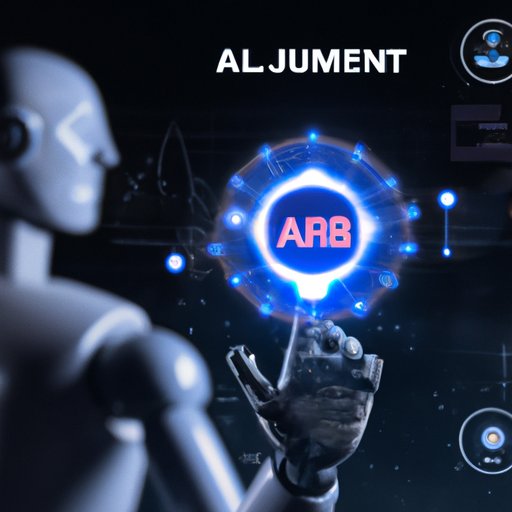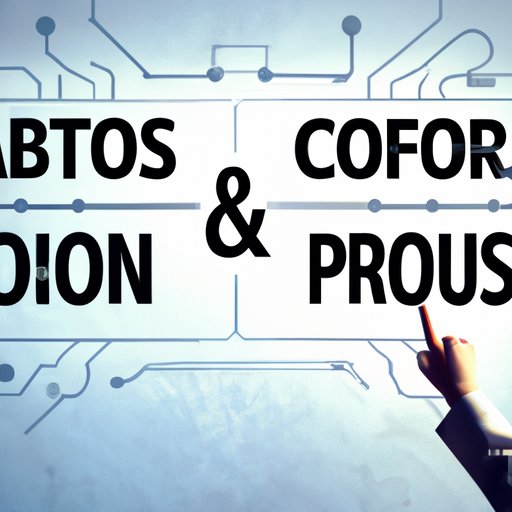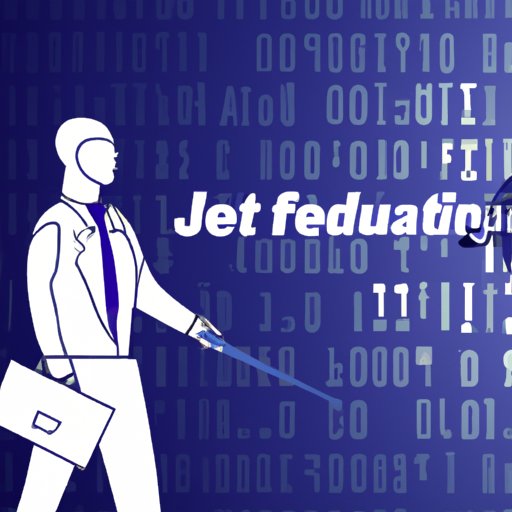Introduction
The advancement of Artificial Intelligence (AI) has been one of the most important technological developments of the 21st century. As AI continues to evolve, so does its impact on the job market, raising questions about the extent to which it will replace human jobs. In this article, we explore the current and potential effects of AI on the job market, and discuss the implications for human employment in the age of automation.

Overview of the Impact of AI on the Job Market
In recent years, AI has had a profound impact on the job market, with a growing number of tasks and professions being taken over by automation. According to a report by McKinsey Global Institute, around 20 percent of all activities across sectors are already automated, and this is expected to rise to as much as 50 percent by 2030. This shift is likely to have a significant effect on human employment, with some predicting that up to 30 percent of jobs could be replaced by AI by the end of the decade.
What is AI and How Does it Affect Human Employment?
At its core, AI is a form of computer technology that enables machines to perform tasks traditionally done by humans. AI systems can be programmed to recognize patterns and make decisions, allowing them to take over a range of activities from customer service to medical diagnosis. By automating these tasks, AI has the potential to reduce the need for human labor, leading to job loss in certain sectors.
Will AI Replace Human Jobs?
The debate over the potential of AI to replace human jobs has been ongoing for many years. On the one hand, there are those who argue that automation will lead to job loss and an increase in inequality. On the other hand, there are those who believe that automation will create new opportunities and drive economic growth. To better understand the potential implications of AI on the job market, it is important to examine both the pros and cons of automation.

Examining the Pros and Cons of Automation
There are a number of potential benefits to automation, including improved efficiency and productivity. Automated systems can process large amounts of data quickly and accurately, reducing the need for manual labor. In addition, AI-powered systems can provide more accurate results than humans, leading to improved accuracy and cost savings. According to a study by Deloitte, using AI-powered automation could save businesses up to $16 trillion in labor costs by 2030.
However, there are also potential drawbacks to automation. While AI-powered systems can improve efficiency and accuracy, they can also lead to job loss. Automation has the potential to replace a wide range of human jobs, from manual labor to professional roles. This could lead to job displacement and an increase in inequality, particularly for those in lower-skilled positions.

Analyzing the Potential for Job Loss in the Age of AI
It is estimated that up to 30 percent of jobs could be replaced by AI by 2030. This includes a range of occupations, from customer service agents and retail workers to truck drivers and lawyers. While some of these jobs may be replaced by new roles created by automation, it is likely that many will be lost altogether. This could lead to an increase in unemployment and a widening of the gap between rich and poor.
In addition, AI-powered automation could lead to a decrease in wages, as employers rely on machines rather than humans to do the work. This could further exacerbate income inequality, as those in higher-paying professions are less likely to be affected by automation.
The Role of AI in Shaping the Future of Human Employment
Despite the potential for job loss, there is also the potential for AI-powered automation to create new opportunities for human employment. For example, AI could open up new areas of research and development, creating demand for professionals with specialized skills. In addition, AI could help to reduce mundane or repetitive tasks, freeing up employees to focus on more creative or strategic activities.
Furthermore, AI could enable companies to expand into new markets and offer new services, creating new jobs in the process. According to a study by PwC, AI could add up to $15.7 trillion to the global economy by 2030, creating millions of new jobs in the process.
Understanding the Implications of Increased Use of AI in the Workplace
Despite the potential for AI to create new opportunities, it is clear that it will also have a significant impact on human employment. To ensure that AI is used responsibly, it is important to understand the implications of increased automation in the workplace. This includes considering the potential for job displacement and wage decreases, as well as the potential for new opportunities.
It is also important to consider the ethical implications of AI. For example, AI-powered systems could lead to biased decision making, as algorithms are only as good as the data they are given. To prevent this, it is important to ensure that AI is developed and deployed responsibly, with proper checks and balances in place.
Exploring Possible Solutions to Mitigate Job Loss
To mitigate the potential for job loss due to AI-powered automation, it is important to consider possible solutions. This includes investing in education and training to help people transition to new roles created by automation. It also means providing support for those affected by job displacement, such as retraining programs and unemployment benefits.
In addition, governments should consider introducing policies to regulate the use of AI in the workplace. This could include laws to protect workers’ rights and to ensure that AI-powered systems are not used to discriminate against certain groups. Such measures could help to ensure that AI is used responsibly and ethically.
Conclusion
AI-powered automation is set to have a significant impact on the job market, with some predicting that up to 30 percent of jobs could be replaced by AI by 2030. While automation has the potential to create new opportunities, it also has the potential to lead to job loss and an increase in inequality. Therefore, it is important to understand the implications of increased automation in the workplace and to explore possible solutions to mitigate job loss.
Ultimately, AI is likely to play a major role in shaping the future of human employment. While there are still many unanswered questions, it is clear that AI has the potential to revolutionize the way we work. By understanding the potential implications of increased automation and taking steps to mitigate job loss, we can ensure that AI is used responsibly and ethically.
(Note: Is this article not meeting your expectations? Do you have knowledge or insights to share? Unlock new opportunities and expand your reach by joining our authors team. Click Registration to join us and share your expertise with our readers.)
